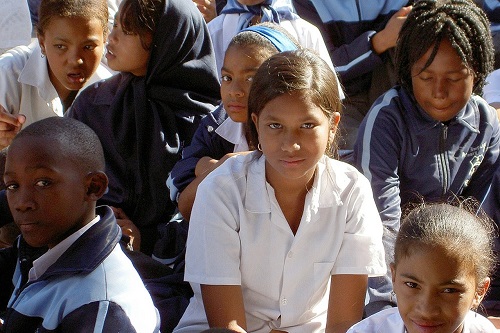pixabay photo
Via
UNICEF
An Unfair Start: Inequality in children’s education in rich countries
Living in a rich country does not guarantee equal access to quality education, according to Report Card 15 from UNICEF Office of Research-Innocenti. Children in less wealthy countries often perform better at school despite fewer national resources, the report says.
An Unfair Start: Inequality in Children’s Education in Rich Countries ranks 41 member countries of the European Union and the Organisation for Economic Co-operation and Development on the extent of educational inequalities at preschool, primary and secondary school levels. It uses the latest available data to examine the link between children’s achievement and factors such as parents’ occupation, migration background, gender and school characteristics.
The report focuses on two child-centred indicators of inequality: At preschool level the indicator is the percentage of students enrolled in organized learning one year before the official age for entering primary school; The indicator for both primary school (Grade 4, around age 10) and secondary school (age 15) is the gap in reading scores between the lowest- and highest-performing students. The ranking at age 15 is the lead indicator in the report because this represents the level of inequality towards the end of compulsory education.
“What our report shows is that countries can offer their children the best of both worlds: They can achieve standards of excellence in education and have relatively low inequality,” said Dr Priscilla Idele, Director (a.i) of the UNICEF Innocenti. “But all rich countries can and must do much more for children from disadvantaged families as they are the most likely to fall behind.”
Countries have different degrees of educational inequality at different educational stages, the report says. Ireland and Slovenia are in the bottom third of countries for preschool enrolment, but move to the middle third at primary school and then the top third at secondary school. France has one of the highest rates of preschool enrolment but then falls to the bottom third in secondary school. The Netherlands goes from being the most equal country in primary school reading scores to ranking 26th of 38 countries when children reach 15 years of age. Towards the end of compulsory schooling, Latvia, Ireland and Spain are the three most equal countries.
In 16 of 29 European countries for which data are available, children from the poorest fifth of households have a lower preschool attendance rate than children from the richest fifth. The patterns persist throughout a child’s schooling. Among children aged 15 who are doing equally well at school, those with parents in high-status jobs are much more likely to continue into higher education than those with parents in low-status jobs.
In 21 out of 25 countries with substantial levels of immigration children who are first-generation immigrants tend to do less well at school at age 15 than non-migrant children. In 15 countries, second-generation immigrant children also do less well than non-migrant children. However, in Australia and Canada, second-generation immigrant children do better than non-migrant children. These patterns reflect varying patterns of migration to different countries.
Girls do better than boys in reading tests in all countries. These gaps tend to widen as children get older. But there are also large differences between countries. At 15 years old, girls only do 2% better than boys in reading in Ireland but over 11% better than boys in Bulgaria.
Findings from the United Kingdom:
- UK ranks 16 in the overall league table
- UK ranks 20 in the early childhood education
- UK is 23 in the primary school rank
- UK is 16 in the secondary school rank
- Bullying in the UK is high
Other significant findings from the report include:
- Lithuania, Iceland, and France have the highest preschool enrolment rates among all countries included in the analysis. Turkey, the United States and Romania have the lowest.
- The Netherlands, Latvia and Finland are the most equal when it comes to primary-level reading outcomes; Malta, Israel and New Zealand have the highest inequality in this area.
- Latvia, Ireland and Spain are the most equal when it comes to reading ability among 15-year-olds. Malta, Bulgaria and Israel have the highest inequality in this area
Recommendations:
The report suggests providing a fair start for all children today is essential for achieving both equality and sustainability, and that the problems are not inevitable but rather shaped by policy. The Innocenti Report Card identifies the following recommendations to reduce inequalities in children’s education:
- Guarantee high-quality, early-childhood education and care to all children.
- Ensure all children achieve a good minimum level of core skills.
- Reduce socio-economic inequalities.
- Close the gender gaps in achievement.
- Produce more high-quality, cross-country, comparable evidence including longitudinal studies to fill knowledge gaps.
- Focus on equality, not just averages.
UNICEF works in some of the world’s toughest places, to reach the world’s most disadvantaged children. Across 190 countries and territories, we work for every child, everywhere, to build a better world for everyone.



No Comments Yet!
You can be first to comment this post!